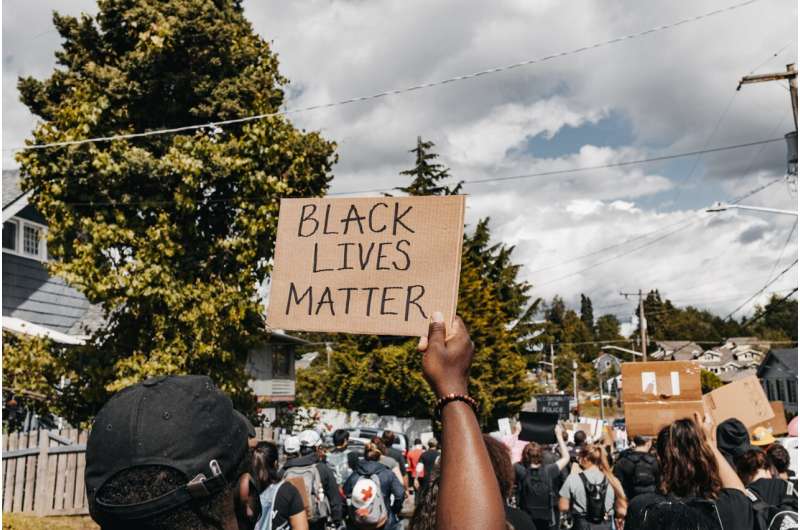This article has been reviewed according to Science X's editorial process and policies. Editors have highlighted the following attributes while ensuring the content's credibility:
fact-checked
trusted source
proofread
How do we talk to our children about Black Lives Matter?

A new study led by psychology researchers at Northwestern University found 84% of Black parents and 76% of white parents had spoken to their 8- to 11-year-old-children about the Black Lives Matter (BLM) Movement within the year following the 2020 murder of George Floyd.
Their research revealed key differences, however, in the language parents used to explain BLM. Among Black parents, 78% affirmed Black lives and acknowledged systemic racism, while only 35% of white parents reported similar messaging.
The study was led by developmental psychologist Leoandra Onnie Rogers. Rogers is an associate professor of psychology at Weinberg College of Arts and Sciences, principal investigator of the DICE lab and a faculty fellow at the Institute for Policy Research at Northwestern.
"While it is notable that many parents, including white parents, were talking with their children about Black Lives Matter, it is more important to consider what parents said," Rogers said.
Prompting the study were the widespread calls in 2020 for national conversations on race, that included children, as highlighted in a Sesame Street Town Hall. Rogers' research during this period was focused on racial identity in middle childhood, and she was curious to learn what parents of 8- to 11-year-old children were saying about race during this socio-political moment of upheaval.
Data for the study were collected via online survey between November 2020 and January of 2021 from more than 700 socio-economically diverse parents of children aged 8-11. Study participants were approximately evenly divided between Black and white parents. Respondents were asked whether they had spoken to their children about BLM, and if so, were asked what they had told their child. Open-ended question responses were then coded and categorized by the research team.
Rogers said the responses showed not all "yes" responses were substantive, and that the conversational approaches parents took varied by race.
Black parents were most likely to "acknowledge inequality" (i.e., "I talk with my son about the wrongful deaths of men and women of color at the hands of police"), and "affirm Black lives" (i.e., "I try to remind him that he is important and worthy despite what the media tells us.")
White parents who gave substantive responses were most likely to "acknowledge inequality," or to "communicate uncritical equality" (i.e., "All lives matter no matter your skin color").
The research team also noted that they found a pattern of verbatim responses copied from the internet. This type of response was mostly used by white parents (14% vs. 1% of Black parents) who had answered the survey with apparent credibility but could not or did not actually report their own thoughts on talking about BLM. In fact, 27% of white parents provided uncodeable responses (27%)—which included nonsensical comments or content copied and pasted word-for-word from Internet sources—making it the most common code for this group.
"Encouraging parents to talk about race, to break the silence, is necessary but insufficient," Rogers said. "The upside is these data suggest that parents are listening to the societal conversation, and the concerted effort to engage parents and families in race talk did seem to influence the overall frequency of the reported conversations. However, the depth and substance of these conversations warrants further attention."
The study, "Exploring whether and how Black and White parents talk with their children about race: M(ai)cro race conversations about Black Lives Matter," was released online in advance of publication by Developmental Psychology.
More information: Leoandra Onnie Rogers et al, Exploring whether and how Black and White parents talk with their children about race: M(ai)cro race conversations about Black Lives Matter, Developmental Psychology (2024). DOI: 10.1037/dev0001693



















